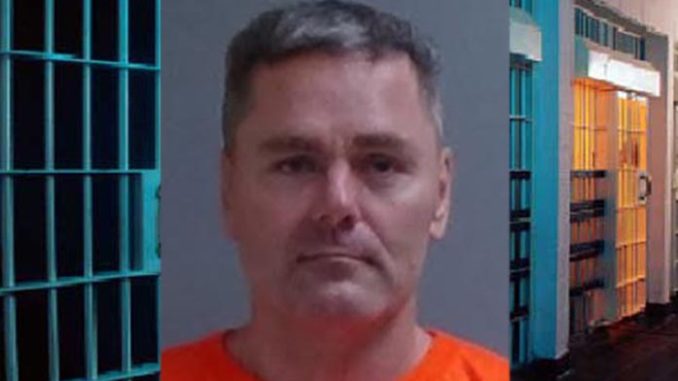
A man sentenced to life in prison for the 1994 shooting death of a Sierra Vista resident isn’t entitled to hearing on whether a prosecutor made misleading statements about evidence 25 years ago, the Arizona Court of Appeals announced last week.
 Earl Felton Crago, Jr. had sought to reopen his case based on a note he claims someone from the Cochise County Attorney’s Office sent to him in 2014 which purportedly exposed alleged prosecutor misconduct. His request was properly denied by a Cochise County judge in November 2019, according to an appellate decision authored by Judge Sean Brearcliffe on March 26.
Earl Felton Crago, Jr. had sought to reopen his case based on a note he claims someone from the Cochise County Attorney’s Office sent to him in 2014 which purportedly exposed alleged prosecutor misconduct. His request was properly denied by a Cochise County judge in November 2019, according to an appellate decision authored by Judge Sean Brearcliffe on March 26.
Court records show Carl H. Davidson disappeared the morning of Sept. 28, 1994 after neighbors heard gunshots. The body wasn’t located for several days. However, a witness placed Crago and his vehicle at the Sierra Vista home where Davidson was last seen.
Crago, then 23, later admitted shooting Davidson three times, then putting Davidson in the car before dumping the body in a wash, although he claimed to have fired in self-defense during an argument related to a drug debt.
Since being found guilty in 1995, Crago has filed more than one dozen appeals, petitions, or federal lawsuits related to his prosecution, sentence, and prison conditions. One such federal lawsuit involved a remotely activated, 50,000-watt shock belt Crago was forced by jail and court security staff to wear throughout his trial.
Jurors weren’t told about the belt, leading one juror to report she thought Crago had smuggled a weapon into the courtroom under his clothing. In a 2006 lawsuit, Crago claimed wearing the belt distracted him from assisting with his defense because he “spent his entire trial conscious of the possibility that the belt he wore would cause him great pain and humiliation.”
A federal judge dismissed Crago’s claim regarding the stun belt, noting it was filed too late to be considered.
One of Crago’s appeals involved the sentence imposed by the trial judge of life in prison without the possibility of release for 25 years. But the judge also ordered Crago to serve a specific length of time on parole as if the sentence was for a flat 25 years, which is what Crago wanted enforced. Even the prosecutor conceded the parole add-on was in error.
Multiple courts later reviewed the sentencing issue, and the final ruling was that the life sentence without release for 25 years was enforceable as the intended sentence. The parole portion of the sentence was deemed unenforceable.
However, Crago also argued he was offered a plea deal prior to trial for 22 years in prison. He also claims the judge advised him the sentence would be 25 years if found guilty at trial. Crago contends he decided it was worth going to trial where he stood a chance at full acquittal, or at the most 25 years, but no court accepted his argument.
Crago’s most recent petition filed with the Cochise County Superior Court involves his assertion in November 2018 that he received a note in 2014 from an unnamed employee of the Cochise County Attorney’s Office claiming that the prosecutor had lied about evidence.
The note purportedly said the victim’s DNA was not found in Crago’s car, even though the prosecutor supposedly told Crago and his attorney that the victim’s blood was found in the car.
In November 2019, a Cochise County judge dismissed Crago’s petition on the basis that Crago had previous opportunities to address evidence issues in other post-conviction filings. Thus, the judge found the 2014 note did not present “newly discovered material evidence” as required by court rules for a hearing on the matter.
In addition, the judge expressed doubts with Crago’s claims about the note. The Arizona Court of Appeals decision last weeks denied a defense request to overturn the local court’s decision.
Crago is currently housed at the Arizona State Prison Complex in Safford with a medium custody classification. Public records show he has received nearly 50 disciplinary write-ups in prison, the most recent being the promotion of prison contraband and possession of a communication device in 2019.
Several of those disciplinary actions involve acts of violence. In 2000, Crago was charged with two counts of aggravated assault against a corrections officer. He was sentenced to 18 months in prison for each count and spent several years in a maximum-security unit.
Crago continues to claim his 25-year sentence made him eligible for release in 2019 and that he is “now being required to serve a sentence beyond the sentence which was imposed.” However, all of the court decisions note the only way for him to be released from custody prior to death is for the Board of Executive Clemency to recommend that Governor Doug Ducey commute the sentence.
Two years before Davidson’s murder, Crago and his younger brother Ray were arrested in Colorado on first-degree murder charges for their involvement in a shooting involving stolen property. Crago was acquitted by a jury but his brother pleaded guilty to manslaughter and was sentenced to 14 years in prison.

